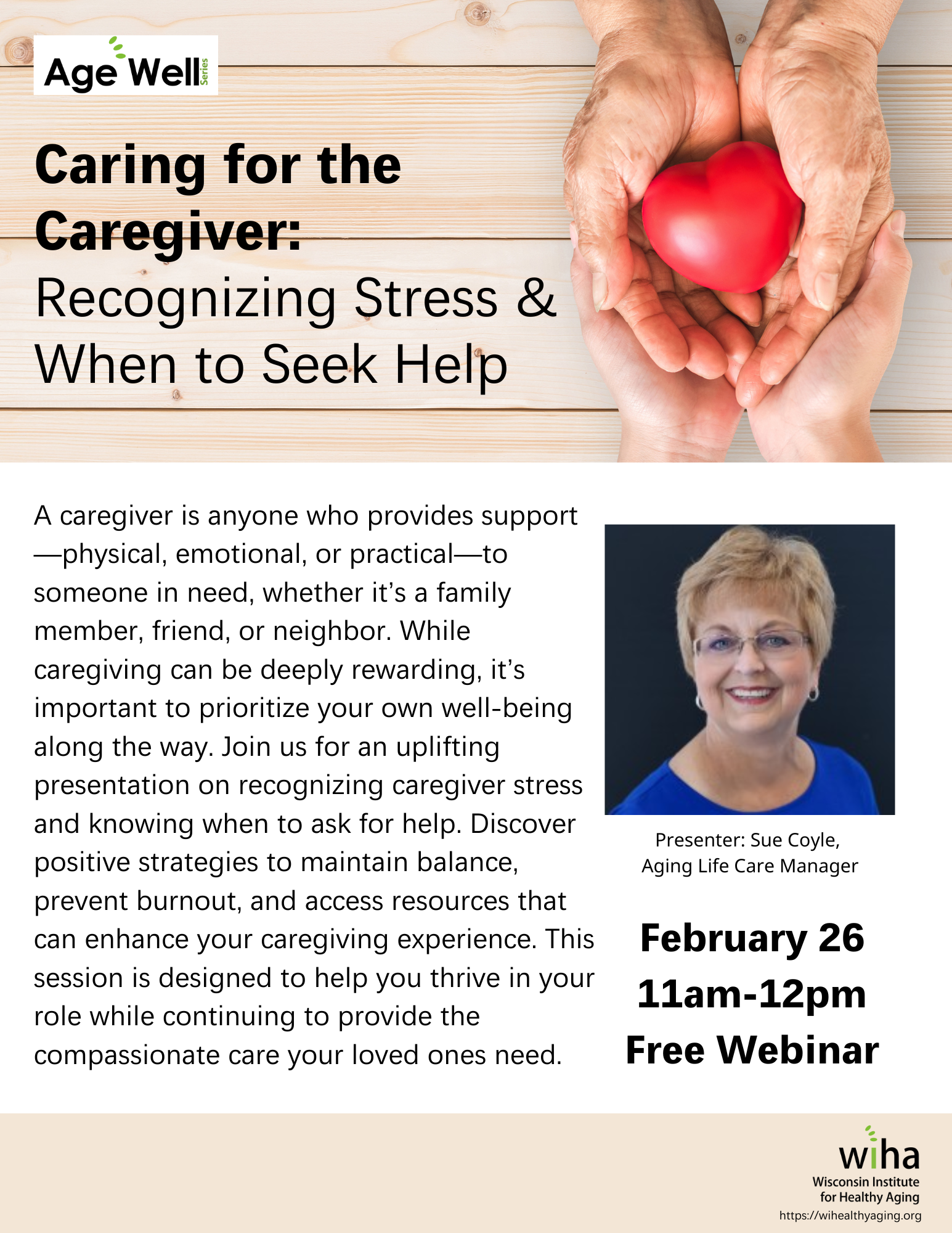
Age Well with WIHA
A newsletter from the Wisconsin Institute for Healthy Aging
Age Well with WIHA: January/February 2025
WIHA’s newsletter is published bi-monthly and sent by email. View the email newsletter online or read the full stories below. Don’t forget to subscribe!
Staying Healthy as You Age
A Guide to Exercise for Older Adults
A recent article shares tips on how older adults can stay healthy and live longer through exercise. Here are the key points explained in simple terms:
Why Exercise Matters
Staying active helps you stay strong, prevent diseases, and enjoy life more as you age. Exercise keeps your heart healthy, your muscles strong, and your mind sharp. It also helps you move better and lowers the risk of falls.
What Kind of Exercises Should You Do?
- Aerobic Exercise:
- This includes activities like walking, swimming, or biking.
- It makes your heart and lungs stronger.
- Aim for at least 150 minutes each week (about 30 minutes a day, 5 days a week).
- Strength Training:
- These are exercises that build muscle, like lifting weights or using resistance bands.
- They help you stay strong and prevent muscle loss.
- Try to do this 2 or more times per week.
- Balance and Flexibility Exercises:
- Activities like yoga or tai chi improve balance and flexibility.
- These help you avoid falls and move more easily.
- Do them several times a week.
Tips for Getting Started
- Start Slow: If you’re new to exercise, begin with short sessions and gradually increase the time and intensity.
- Make It Fun: Choose activities you enjoy, like dancing or gardening.
- Get Help: Ask your doctor or a fitness trainer for advice on what exercises are safe for you.
Overcoming Challenges
- If you feel unmotivated, join a group or find a workout buddy. Exercising with others can make it more enjoyable.
- If you have health issues, talk to your doctor about exercises that work for you.
- If time is a problem, try breaking up exercise into 10-minute chunks throughout the day.
What Are the Benefits?
- Better Health: Exercise can lower your chances of getting diseases like diabetes, heart problems, and even some cancers.
- Improved Mood: Physical activity helps reduce stress, anxiety, and depression.
- More Independence: Staying active keeps you strong and able to do daily tasks on your own.
How to Keep Going
- Make a schedule and stick to it.
- Celebrate your progress—every little bit helps!
- Remember, it’s never too late to start exercising!
By staying active, you can enjoy a longer, healthier, and happier life. For more details, check out the full article on this topic.
Recipes for Connection
Laughing with family or friends, talking about your day, or giving thanks are often at the center of sharing delicious meals together. A common theme? Connection! As we’re gathered together around a table for an evening meal or preparing food in the kitchen it allows us to spend time with people we care about as we fill our stomachs and nourish our social health.
At one time or another, we’ve probably all felt lonely or isolated. This can be temporary, due to changes in working status or relationships or can be felt more long-term. The United States Surgeon General recently released “Recipes for Connection“, a guide to spark ideas for gathering around food. Oftentimes we connect over a meal, while baking cookies, or passing down family recipes. “Recipes for Connection” includes real-life examples of connecting around food and strengthening bonds and feelings of belonging and togetherness.
We encourage you to use and share this guide to strengthen and spark connections, give thanks, expand your circle and host celebrations beyond the holidays.
Both loneliness (the gap between your desired levels of social contact and actual social contact) and social isolation (the number of contacts you have)are associated with serious health impacts including a 29% increased risk of heart disease, a 32% increased risk of stroke, and a 50% increased risk of dementia as well as a significant increased risk for depression and anxiety. Take time to build your connections. You may start small but challenge yourself and see the difference it makes. Use the “Recipes for Connection” guide to get started.
To learn more tips to stay connected, visit ConnectWI.org.
Falls Prevention for Caregivers
Did you know that caregivers are at an increased risk of falling? According to studies, the physical and emotional demands of caregiving can lead to fatigue, stress, and even neglect of personal safety, all of which contribute to a higher likelihood of falls.
WIHA and Falls Free® Wisconsin have teamed up to develop resources specific to caregivers to help reduce your risk of falls! Visit the Falls Free Wisconsin website to download resources on Balance & Strength, Sight, Hearing Loss, Home Safety, Medications, and Safe Footwear – all specific to caregivers.
Find a Workshop
Take charge of your health by taking a WIHA workshop. We offer in-person and virtual (online or by phone) programs that give you the tools to age well. Getting started is easy – simply click the link below.
In this Issue
How to Live a Longer, Healthier Life
Check out this 2-minute video from the director of the National Institute on Aging to learn what current research says we can do to live a longer, healthier life.
Featured Program: Stand Up for Your Health
Stand Up for Your Health is a fun, interactive workshop designed to help you reduce your sitting time. This 5-session workshop meets once per week for four weeks and then again on week 8. The workshop reviews why standing up and moving more is important, how sitting time impacts your health, and helps you to stand more by working through goal setting and problem-solving. Take charge of your health and sit less – with the Stand Up For Your Health workshop!
Research: Stand Up for Your Health is an evidence-based program shown to reduce your sitting time. Sitting time (or sedentary behavior) has been shown to increase the risk for chronic conditions. This 5-session program explains why sitting time is bad and what you can do to stand up and move more.
Who is it for: Stand Up for Your Health is designed for those over the age of 55 who sit more than 6 hours per day.
How to participate: You can participate in Stand Up for Your Health in-person or virtually. Find a workshop near you.
“The awakening of just standing up and how much it improved my life was valuable. Once you start counting the minutes, you understand how much you are sitting. I have incorporated more standing during the day into our lifestyle.”
Sue C.
Vilas County, WI

Enjoyed the newsletter? Subscribe today!

